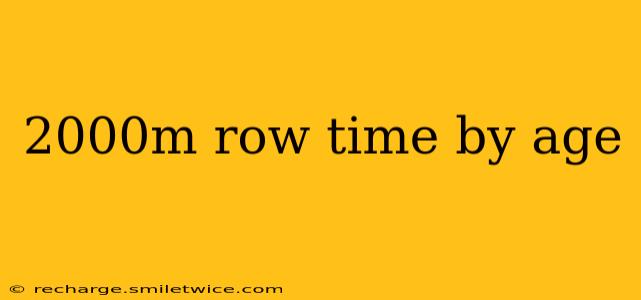2000m Row Time by Age: A Comprehensive Guide to Performance Benchmarks
Rowing, a demanding full-body workout, offers incredible cardiovascular and strength benefits. Understanding your 2000m row time relative to your age and fitness level is crucial for tracking progress and setting realistic goals. This guide provides benchmarks and insights to help you interpret your performance and strive for improvement. We'll also address common questions surrounding this popular fitness metric.
What is a Good 2000m Row Time?
There's no single "good" 2000m row time. Performance depends heavily on age, gender, training experience, and overall fitness. However, we can establish general benchmarks to give you a frame of reference. These are broad ranges, and individual results will vary.
- Beginner (Little to no rowing experience): Expect times between 8-10 minutes for men and 9-11 minutes for women.
- Intermediate (Regular rowing, some training): Times may fall between 7-8 minutes for men and 8-9 minutes for women.
- Advanced (Consistent training, possibly competitive rowing): Advanced rowers may achieve times under 7 minutes for men and under 8 minutes for women.
These are just guidelines. Consider using online rowing calculators or comparing your time to others of similar age and experience in your gym or rowing club.
How Do I Improve My 2000m Row Time?
Improving your 2000m row time requires a holistic approach encompassing several key areas:
- Consistent Training: Regular rowing sessions are paramount. A balanced program incorporating intervals, steady-state rows, and strength training will yield the best results.
- Proper Technique: Efficient technique maximizes power and minimizes energy waste. Seek instruction from experienced rowers or coaches to refine your form.
- Strength Training: Building strength in your legs, core, and back is crucial for powerful rowing strokes. Incorporate exercises targeting these muscle groups into your training regimen.
- Nutrition and Hydration: Fueling your body with a balanced diet and staying adequately hydrated is essential for optimal performance.
- Rest and Recovery: Allow your body adequate time to recover between workouts to prevent injury and promote muscle growth.
What Factors Affect My 2000m Row Time?
Many factors contribute to your 2000m row time beyond just training. Understanding these elements can help you manage expectations and tailor your training plan effectively.
- Age: As we age, our physiological capabilities may change, affecting performance. Younger individuals generally achieve faster times.
- Gender: Men typically achieve faster times than women due to differences in muscle mass and strength.
- Training Level: Consistent and targeted training is the most significant factor. Beginners will naturally have slower times compared to experienced rowers.
- Rowing Machine: Different rowing machines may have slight variations in resistance and calibration, influencing your time.
- Ergometer Calibration: Ensure your rowing machine is properly calibrated to ensure accurate readings.
Are There Age-Specific Benchmarks for 2000m Row Times?
While precise age-specific benchmarks are challenging to establish universally, many online rowing communities and forums share data and comparisons. These often allow you to compare yourself to others in your age group. Remember, these are still just general guidelines. The best benchmark is your own personal best, and your progress over time.
How Can I Track My Progress and Set Goals?
Tracking your progress is essential for motivation and improvement. Use a rowing log, app, or online platform to record your times and other metrics (like strokes per minute, average watts, and calories burned). Set small, achievable goals to gradually improve your 2000m row time. Don't be discouraged by plateaus; they're a normal part of the training process. Focus on consistent effort and proper technique.
This comprehensive guide should provide a solid foundation for understanding your 2000m row time and setting realistic goals. Remember to prioritize proper form, consistent training, and adequate rest to maximize your results and avoid injury. Happy rowing!
